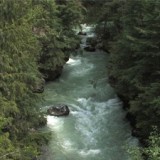This story was in the Nelson Post for November 15:
BC Hydro and AXOR, the company behind the Glacier/Howser power project, no longer have a power purchase agreement. Just what that means for the controversial hydroelectric generating project is unclear, but the Nelson-Creston MLA says it’s “great news.”
Michelle Mungall, MLA for the Nelson-Creston riding, says she heard the news after she received a copy of an email from a source. The email, sent by a BC Hydro employee, reads: “‘BC Hydro no longer has an electricity purchase agreement with AXOR for the Glacier/Howser project,’” says Mungall, reading directly from the email sent on Tuesday, Nov. 9, 2010.
When I first read the story I was tempted to defy my age, bad knees, and avoirdupois and do some handsprings! For if the story is true, this is a huge decision and is bound to have a serious ripple effect throughout the province. But it quickly dawned on me that there must me much more to the story than meets the eyes.
Who cancelled the contract – was it BC Hydro or the company? On what grounds?
We soon learned from a representative of the company that as a result of delays to the project – the contract for which has been in place since back in 2006 – Axor was looking at hefty fines for failing to meet the terms of its contract and be delivering power by now, when the project is mired in the environmental assessment process and bogged down by massive public opposition.
Whatever the case – and BC Hydro has not been forthcoming with these answers – the fact remains the project wouldn’t have been delayed this long and the company wouldn’t have anything more to do before screwing up the Glacier-Howser rivers had it not been for the folks in the Kootenays who rose as one against this project and made it clear that they will do damned near anything to stop this project. Kudos also to West Kootenay EcoSociety, the Wilderness Committee, and MLA Michelle Mungall. For what’s worth, Damien and I, then with Save Our Rivers Society, were involved in this issue.
I’m going to conclude the piece with my educated guess as to what really happened and what will happen now. But first, a very important principle, no matter where the project is, has been underscored here. This principle affects every project in line for approval and this concern for the Bull Trout in the watersheds of the proposed Glacier-Howser project is a clarion call for us to emphatically state this principle as guiding all applications.
It is the question of “fish values”. The BC Environment Assessment Office, which has never denied a license, did send this matter back to Axor (the Dupont family) for further review because of the threat of the Glacier-Howser project to Bull Trout.
This is critically important because applicants have hitherto assumed and stated the assumption that all they need worry about is migrating Pacific salmon. Not that they worried very much, but let’s take a look at why the EAO’s now concerned about Bull Trout, which don’t migrate, and thus are what’s known as “resident fish”. That the EAO has made this issue a substantial part of their concerns here has implications that are immense.
The question of “significant fish values” (the term BC Hydro uses) in our rivers and streams is confusing to many and one can understand this.
Salmonids contain three principal branches and what’s confusing is that the popular names are often not the same as their real names.
Under the appellation “Salmo” are the Atlantic salmon and Brown Trout (some of which go to sea and are called Sea-Trout).
Then there are the Pacific salmon which carry the Latin name “Oncorhynchus” which include Chinook, Coho, Chum, Sockeye and Pink (there is another species, Masai, confined to Asia) and for the last couple of decades, the Rainbow (Steelhead when it goes to sea) and Cutthroat which (are you ready for this) were for a very long time styled as Salmo (I, personally, can’t understand how these two species can be Oncorhynchus when unlike the others, don’t die after spawning and can and do interbreed unlike the rest but a fish biologist I’m not). These salmon, along with steelhead, all migrate to the ocean and return to their home rivers.
Then there are Char which, to add to the confusion, are often called trout. They include the Brook Trout, the Dolly Varden, and Bull Trout amongst others. And the latter two are found throughout BC and are often confused with each other because they’re similar in appearance.
Just to hopelessly confuse, there are often strains of these fish groups which, while biologically the same as others, have differences in appearance, such as the Gerard Rainbows of Kootenay Lake, sea going Rainbows (Steelhead), and Kamloops Rainbow trout; as with the Bull trout of the Pitt River system and those in Glacier-Howser.
I make this point to demonstrate that Bull Trout are as critical to the ecologies of which they are part as any other salmonid by whatever name they are called, whether they migrate or not.
The significance of the EAO’s Glacier-Howser decision, is that it recognizes that it isn’t only the Pacific salmon you look to in determining “significant fish values”, for it follows that the Bull Trout and its cousin Dolly (Varden) which abound in most rivers and streams in BC must be included; thus it also follows that resident salmonids, not just migrating salmonids, must be part of any environmentalist assessment of every river.
It should be noted that their decision to send Axor back to the drawing board with their proposal had much to do with the record-breaking thousand-plus written submissions that followed these fabled public meetings – one of which was jointly authored by DFO and local First Nations, raising these very concerns about unique blue-listed Bull Trout populations threatened by the project.
Up until now private power developers (IPPs) have been able to say that either there were no fish values because there are no migrating Pacific salmon (almost impossible in BC rivers and streams) or if there are, assure us that these migrating fish in the river they’re damming don’t return as high as the diversion stretch (also often demonstrated to be untrue), shows their deep and abiding love of the environment. Not only is this dangerous nonsense, now they must deal with resident fish such as resident Rainbow, Cutthroat, Rainbow/Cutthroat Crosses, Dolly Varden and Bull Trout. As well they should.
Quel difference! All rivers in BC finally are seen as having “fish values”. They all are centerpieces of ecologies, including fauna and flora, of which fish are an integral and sustaining part. I assert with confidence that there is not an IPP that doesn’t seriously and adversely affect the river, its fish, and its ecology.
IPPs are monstrous projects, no matter how you look at them, but I can assure you that as the Common Sense Canadian takes our message all around the province, we will raise the profile given to resident fish.
Under their secret contract with BC Hydro we must assume that failing to meet timelines means the contract is terminated or can be terminated. From the BC Hydro information we have, it would seem that the timelines, not having been made, Axor is toast.
But, sadly, this seems so out of synch with how these Liberal bastards behave towards large donor corporations we have to look at what else might be happening.
What if the deal is this?
Axor has lost this contract but has been told by Hydro, “nudge, nudge, wink, wink do you get my drift?”, that they can re-apply; start all over again. And what if this “nudge, nudge” is saying don’t worry, you will not have to go all through the process of the “Clean Power Call”, hardly open bidding process anyway, but can negotiate directly with Hydro and not only get your new contract without a hassle, but also negotiate the price up at the same time?
I make this point about price because although these IPP agreements are as secret as a political leader’s mistress, they do have a form to follow including a full environmental assessment process, or better said, as full as such a sham can be.
With any government with an ounce of integrity, one would be loath to make this point. But this government is as crooked as the proverbial hind leg of Fido and simply could not care less about the environment.
Having lost their contract, should they not be able to successfully
negotiate a new one, will Axor also finally forfeit their licenses to
the rivers? They should.
And this raises another issue, doesn’t it? Could this be why licence granting has been taken away from the Minister of Environment and given it to a new ministry, Natural Resource Operations, under a nonentity, Steve Thomson, who is now also Energy Minister? I mean, how cosy can it get?
I think I’ll hold off those geriatric handsprings for awhile yet!


